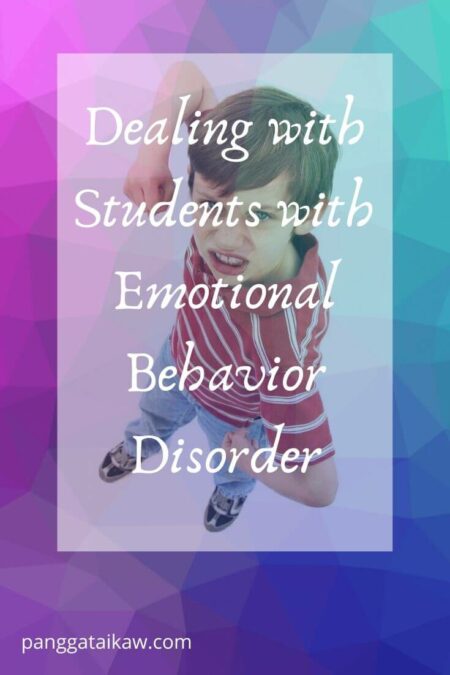Author: Teacher Rica Rubas ( K-12 Special Education Teacher )

In my 8 years as a Special Education teacher, I have encountered several students with Emotional Behavior Disorder ( EBD ) and dealing with them in the classroom is a consistent struggle.
Lots of patience and understanding is an understatement.
Only one student with EBD who becomes violent or disruptive would affect everybody in the class.
Thus, it is really important to know how to face these challenges in my day to day work. That is, before the pandemic, when the students are physically in the classroom everyday.
Okey, to fully understand these kids, let me clarify what defines this disorder.
What is EBD?
EBD stands for Emotional Behavior Disorder. It is a disability characterized by the following:
- An inability to control feelings or emotions toward something.
- An inability to build or maintain satisfactory interpersonal relationships with peers and/or teachers. For preschool-age children, this would include other care providers.
- An inability to learn which cannot be adequately explained by intellect, sensory or health factors.
- Consistent or chronic inappropriate type of behavior or feelings under normal conditions.
- Displayed pervasive mood of unhappiness or depression.
- Displayed tendency to develop physical symptoms, pains or unreasonable fears associated with personal or school problems.
A student with EBD exhibits one or more of the above emotionally based characteristics of sufficient duration, frequency and intensity that interferes significantly with educational performance to the degree that provision of special educational services is necessary.
Techniques in dealing with Students with EBD
These have been so effective for me, based on my experiences. I know there are more tips out there, but these ten techniques have helped me have that satisfaction in my heart knowing that I have done my best after a day of overcoming the challenges that I face.
1. Establish classroom rules and routine.
It is vital to establish classroom rules and routine. This has been my 1st rule of thumb since I’ve started teaching and I really find it effective. Once you already established the classroom management, everything follows as well as learning.
2. Be consistent all the time.
When it comes to shaping students’ behavior. It is really vital to be consistent all the time. Like for example, always keep your promises to your students. Whenever you say you will reward their good behaviors, then you really need to keep that promise. And if they misbehave, then you automatically give them the consequence that they deserve and show them that you will not tolerate their bad behaviors.
3. Choose your battles wisely.
I know we usually lose our temper and that’s normal most especially if we get physically hurt by our students but we should always keep in mind that these students need us to help them control their anger and understand their situation.
Based on researches, people with Emotional Behavior Disorder are struggling in controlling their emotions and not fully cognizant of it.
This post contains Affiliate links. Read the full Affiliate Disclosure here.
4. Read more books and attend professional development trainings.
As a Special Education Teacher, it is really essential for me to read more books and attend professional development trainings which are related to my chosen field.
In the Philippines, I used to buy and collect second hand books about the different diagnosis of my students. Reading these books greatly helped me to become more abreast in understanding their real situation that sometimes cannot be seen by our naked eyes, as well as identifying the most effective strategies in dealing with their temper tantrums or meltdown.
Related post: Weighted Blanket ( review ) – for Autism Meltdown
Read these books for added information. Click the image to buy





5. Use a Token System.
Token System also called Token Reinforcement System or a Token Economy is used to increase appropriate behavior and learning via visual aids.
Tokens, or rewards, are the reinforcers that the child earns and that are then exchanged for a larger reward based on the child’s success.
For the past 8 years of my SpEd teaching journey, I can say that using a token system is really effective for all ages of students. Providing verbal praises, 5 to 10 mins of break or playtime, doing high fives, simple snacks and the use of “treasure chest box” are some of the effective tokens for my elementary students.
Giving 20 mins of break only every Friday and asking them about their personalized gifts are examples of effective tokens for my high school students. They usually get their prize from me quarterly as compared to my elementary students which is weekly. The reason behind this is because elementary students need immediate reinforcements as compared to high school ones due to their waiting skill abilities and level of maturity.
6. Keep track of their progress using different varieties of chart.
Monitoring students’ progress is also very important in all types of classroom setting. Personally, I used to make different types of chart to keep track of my students’ progress both academically and behaviorally.
To monitor their reading and math progress, I always use DIBELS Progress Monitoring Chart because this is the kind of program that my school wants me to use for my students. It is a weekly based assessment with an embedded bar graph that clearly shows their current level of performance.
In line with this, I am always making sure that I have a behavior chart for all my students.
7. Don’t take things seriously.
Exactly!
We may find ourselves frustrated sometimes whenever we feel overwhelmed in dealing with their temper tantrums most especially during those times that we physically get hurt by them. But the truth is, it’s not their intention to hurt us.
These students have difficulty in controlling their emotions and feelings. That’s why sometimes they still have the tendency to hurt us without having the intention to do it.
As a matured adult working with these kinds of students, it is our responsibility to fully understand their real situation and help them overcome it.
8. Encourage a strong collaboration between school and home.
Any school organization should always promote a strong collaboration between school and home. Communication, consistency and trust between team members and the students’ parents are really important to help students achieve success.
9. Be a positive thinker and always keep the faith.
Indeed!
Life has its ups and downs. But despite these things, we should always see the brighter side and silver lining of every situation.
I do believe in the saying “When you focus on PROBLEMS, you will have more PROBLEMS but when you focus on POSSIBILITIES, you’ll have more OPPORTUNITIES.”
It’s also like having the mantra of “mind over matter” and personally, I always find it effective.
10. Teach with a heart.
Since I started teaching way back in 2012, my mom who is also a teacher used to tell me that I should always “teach with a heart”.
For the time being and based from my 8 years of teaching experience, I can proudly say that this teaching mantra is 100 percent true and effective.
Most importantly, the more you show your love and concern to your students with special needs, the higher the chance that they will respect and love you back.
Case Study
Student A was only 8 years old when I worked with him way back 2017. He is a typical kid who loves to play computer games most of the time. He is the only child in the family and lives with his grandma.
Aside from having Emotional Behavior Disorder, this student is also diagnosed with Fetal Alcohol Syndrome which is related to his aforementioned diagnosis.
He has the tendency to do self-hitting behaviors as well as hurting other people physically.
He prefers to be alone all the time. He always refuses to do the tasks given by the teacher. He has the tendency to manipulate the adults supervising him.
He’s not even scared of the school principal nor his grandmother. He does not care if he always goes to the Independent Support Services ( ISS ) Room. He always wants to get things his way and has the power to control everything.
There was a time when he was really uncontrollable. While we were working on a math worksheet, he suddenly broke his pencil and threw everything on the floor (e.g. books, instructional materials and computers) while saying the phrase “I hate school!” I tried everything to pacify him such as asking him nicely as to why he got frustrated and make some arrangements with him but unfortunately, he was really so distressed.
Due to these reasons, I had to press the button to call for help. The school principal and the ISS personnel came to help me.
I told my paraprofessional/teacher assistant to bring the rest of the students to the other classroom because student A was really violent.
He even stabbed the school principal using a pencil because he was refusing to go with him to the ISS room. A small amount of blood came out and it was a good thing that the wound was not too deep.
The ISS personnel had no other choice but to lift Student A just to bring him to the ISS room. They called Student A’s grandma and explained everything that happened in the Resource Room.
As the Special Education Teacher, I had to make the Behavior Intervention Plan to document everything, address the issue and provide recommendations. The school principal and Special Education Director approved it and decided to suspend Student A for a couple of days to give him an ample time to realize his mistakes and give the other necessary disciplinary actions.
Student A’s grandma had shared with us that he was refusing to take his calming pills because he does not like the taste of it and that’s probably the reason why he was severely uncontrollable.
We truly understand his diagnosis and current situation at home but of course we really had to give the disciplinary actions because he stabbed the school principal and committed property damage which are considered as major school offenses.
Being a SPED Teacher is Rewarding
I hope this post will help the new SPED teachers out there who maybe starting to get overwhelmed with dealing with his students with Emotional Behavior Disorder.
Like you, I was there. It took me awhile to find my place and immerse in my work and my students. Along the way, I have learned how to deal with my students and I am still learning.
At this point in my career, at the end of everyday’s struggles in school, I feel so rewarded that I am able to help my students with EBD to contain their emotions and just be accepting of learning and what the teacher has to offer.
There will always be instances that they cannot control how they feel and the anger inside just bursts, but I have to remain calm and think fast on how to pacify them and just go on with the lessons.
After a long day at school, I always look forward to go home and relax, unwind with friends and loved ones, and cook my meal or my comfort food. My plants and flowers are always welcoming too, when I get home.
I have to do self-care, so I will be ready for classes again the next day.
Sharing my favorite quote from an unknown author: ” Some see the disabilities, but Special Education teachers see the possibilities. “
( Teacher Rica has been a Special Education teacher for 8 years and presently teaching students with Emotional Behavior Disorder, Specific Learning Disabilities, and Cognitive Disability for almost 5 years. )
Learn more about her in this interview.
Do you have a child with Emotional Behavior Disorder who is being helped patiently by a SPED teacher ? Please share your story with us .
If you are a SPED teacher, do you have other tips on how to deal with outbursts of your student/s with Emotional Behavior Disorder? We would like to know more.



Hello there,
Thanks for sharing this awesome article, I must say it is definitely going to be of help to a lot of teachers out there.
I know dealing with students with such a critical state is not a very easy one as it takes a lot to manage them and I think with these tips it would be a piece of cake.
Hi,
It’s definitely a lot of challenge for our SPED teachers to mentor these students with EBD and teacher Rica has found ways to effectively teach them.
Thanks for reading.
Marita
I found this article very interesting because it is an area I have worked in myself and in which my husband still works.
Your approach is very similar to ours except we use Choice Theory. If you haven’t already studied this it would be a useful area to add to your professional development.
Some schools train all their teachers as well as parents. You are already doing much of what Dr Glasser (developer of choice theory) recommends.
In a nutshell it’s about creating the best environment for all children to meet their needs for learning.
It sounds like the child you described has low love and belonging and survival needs and high power and freedom needs.
I am Debzo in WA if you would like to connect 🙂
Hi Deb,
Thanks for sharing your experiences in taking care of kids with EBD. Rica, the SPED teacher/author will surely appreciate your input.
God bless,
Marita
Articles like these are always inspiring. Teaching special kids is not for everyone, thus, I have great admiration for people who choose to do this.
Rica is one of those beautiful people who makes this world a really awesome place to live in!
Hi Odette,
Truly our SPED teachers like Rica, who are so passionate in their craft are commendable.
Thanks for reading.
Marita
Thank you so much for sharing with us a wonderful and informative article about dealing with students with emotional behavior.
I have learned a lot of knowledge about EBD. I like best your technique of a strong collaboration between home and school. When children are cared for on the basis of a good relationship between school and home, their mental development is properly formed.
I recently bought The Survival Guide for Kids to understand children’s behavior and learned a lot from it.
Finally, I have read and enjoyed your article so I want to share what you have written about the emotional behavior of children in my Facebook group so that parents can understand it and act accordingly.
Glad to know that you learned something from this post. The author, Teacher Rica has 5 years of experience dealing with students with EBD, thus her tips are very effective and helpful.
Thanks for sharing to your FB group.
Marita